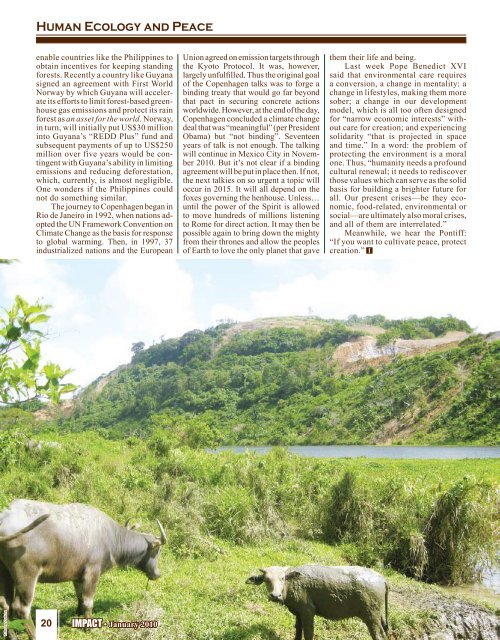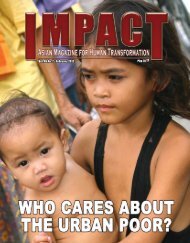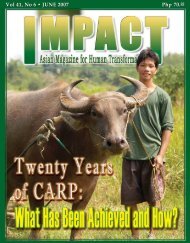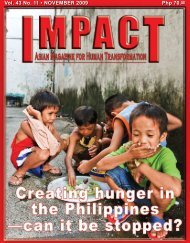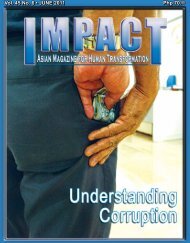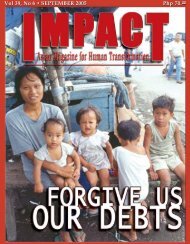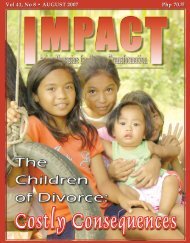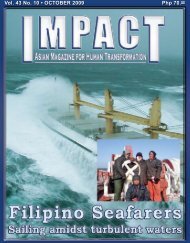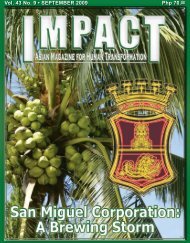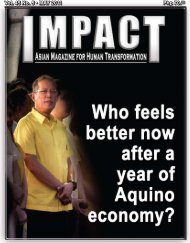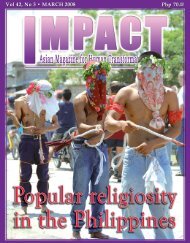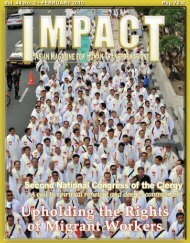Php 70.00 Vol. 44 No. 1 • JANUARY 2010 - IMPACT Magazine Online!
Php 70.00 Vol. 44 No. 1 • JANUARY 2010 - IMPACT Magazine Online!
Php 70.00 Vol. 44 No. 1 • JANUARY 2010 - IMPACT Magazine Online!
You also want an ePaper? Increase the reach of your titles
YUMPU automatically turns print PDFs into web optimized ePapers that Google loves.
Human Ecology and Peace<br />
enable countries like the Philippines to<br />
obtain incentives for keeping standing<br />
forests. Recently a country like Guyana<br />
signed an agreement with First World<br />
<strong>No</strong>rway by which Guyana will accelerate<br />
its efforts to limit forest-based greenhouse<br />
gas emissions and protect its rain<br />
forest as an asset for the world. <strong>No</strong>rway,<br />
in turn, will initially put US$30 million<br />
into Guyana’s “REDD Plus” fund and<br />
subsequent payments of up to US$250<br />
million over five years would be contingent<br />
with Guyana’s ability in limiting<br />
emissions and reducing deforestation,<br />
which, currently, is almost negligible.<br />
One wonders if the Philippines could<br />
not do something similar.<br />
The journey to Copenhagen began in<br />
Rio de Janeiro in 1992, when nations adopted<br />
the UN Framework Convention on<br />
Climate Change as the basis for response<br />
to global warming. Then, in 1997, 37<br />
industrialized nations and the European<br />
Union agreed on emission targets through<br />
the Kyoto Protocol. It was, however,<br />
largely unfulfilled. Thus the original goal<br />
of the Copenhagen talks was to forge a<br />
binding treaty that would go far beyond<br />
that pact in securing concrete actions<br />
worldwide. However, at the end of the day,<br />
Copenhagen concluded a climate change<br />
deal that was “meaningful” (per President<br />
Obama) but “not binding”. Seventeen<br />
years of talk is not enough. The talking<br />
will continue in Mexico City in <strong>No</strong>vember<br />
<strong>2010</strong>. But it’s not clear if a binding<br />
agreement will be put in place then. If not,<br />
the next talkies on so urgent a topic will<br />
occur in 2015. It will all depend on the<br />
foxes governing the henhouse. Unless…<br />
until the power of the Spirit is allowed<br />
to move hundreds of millions listening<br />
to Rome for direct action. It may then be<br />
possible again to bring down the mighty<br />
from their thrones and allow the peoples<br />
of Earth to love the only planet that gave<br />
them their life and being.<br />
Last week Pope Benedict XVI<br />
said that environmental care requires<br />
a conversion, a change in mentality: a<br />
change in lifestyles, making them more<br />
sober; a change in our development<br />
model, which is all too often designed<br />
for “narrow economic interests” without<br />
care for creation; and experiencing<br />
solidarity “that is projected in space<br />
and time.” In a word: the problem of<br />
protecting the environment is a moral<br />
one. Thus, “humanity needs a profound<br />
cultural renewal; it needs to rediscover<br />
those values which can serve as the solid<br />
basis for building a brighter future for<br />
all. Our present crises—be they economic,<br />
food-related, environmental or<br />
social—are ultimately also moral crises,<br />
and all of them are interrelated.”<br />
Meanwhile, we hear the Pontiff:<br />
“If you want to cultivate peace, protect<br />
creation.” I<br />
© Rodne Galicha<br />
20<br />
<strong>IMPACT</strong> <strong>•</strong> January <strong>2010</strong>


